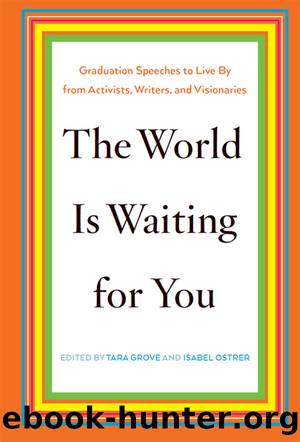The World Is Waiting for You by Tara Grove

Author:Tara Grove
Language: eng
Format: epub
ISBN: 9781620970911
Publisher: The New Press
II.
A few words first about empathy and reason prior to the story of my remarkable discovery of Empathy Deficit Disorder, a feat sure to be honored with great renown. In the May 20, 2013, edition of the New Yorker, Paul Bloom wrote a concise (if not exactly Lincolnesque) essay called âThe Baby in the Well.â Itâs a critique of our ready rush to empathy as the answer to all the worldâs ills, including the ones we so often see in our work. The essayâs title refers to a story I remember well, as will your parents. In 1987, a baby named Jessica McClure fell into a well somewhere in Texas. Bloom goes on to mention similar well-recalled events, from another child who in 1949 fell into some other well, to those without happy endings, such as the 2005 disappearance of a teenager named Natalee Holloway while vacationing in Aruba. âWhy,â he asks, âdo people respond to these misfortunes and not to others?â Bloomâlike many of you here, a student of psychologyâreviews the works of his colleagues: âThe psychologist Paul Slovic points out that, when Holloway disappeared, the story of her plight took up far more television time than the concurrent genocide in Darfur. Each day, more than 10 times the number of people who died in Hurricane Katrina die because of preventable diseases and more than 13 times as many perish from malnutrition.â
Empathy, Bloom concludes, âhas some unfortunate featuresâit is parochial, narrow-minded, and innumerate.â As to how the term is innumerate, he makes (for those of you not leaving UD with a degree in applied mathematics) the following point: âThe number of victims hardly mattersâthereâs little psychological difference between hearing about the suffering of 5,000 and that of 500,000. Imagine reading that 2,000 people just died in an earthquake in a remote country, and then discovering that the actual number of deaths was 20,000. Do you now feel 10 times worse? To the extent that we recognize the numbers as significant, itâs because of reason, not empathy.â The essayist concludes as follows: âOur best hope for the future is not to get people to think of all humanity as familyâthatâs impossible. It lies, instead, in an appreciation of the fact that, even if we donât empathize with distant strangers, their lives have the same value of the lives of those we love.â
I went back and read the essay again yesterday, since I so often rely on empathy and work in such âremoteâ countries, including one not so remote from Delaware in which a recent earthquake took more than 200,000 lives. Bloomâs tone may be grumpyâand Iâm not saying that because heâs a professor at Yaleâbut I get his point: empathy is not only innumerate but also an âunstable emotion,â like pity or mercy or compassion. But can unstable emotions like empathy and compassion be transformed into something more enduring? Can a spark of empathy once ignitedâhowever briefly, however tenuouslyâlead to reasoned decisions and to compassionate policies that might transform our
Download
This site does not store any files on its server. We only index and link to content provided by other sites. Please contact the content providers to delete copyright contents if any and email us, we'll remove relevant links or contents immediately.
| Diaries & Journals | Essays |
| Letters | Speeches |
The Rules Do Not Apply by Ariel Levy(4969)
Bluets by Maggie Nelson(4556)
Too Much and Not the Mood by Durga Chew-Bose(4348)
Pre-Suasion: A Revolutionary Way to Influence and Persuade by Robert Cialdini(4232)
The Motorcycle Diaries by Ernesto Che Guevara(4099)
Walking by Henry David Thoreau(3962)
Schaum's Quick Guide to Writing Great Short Stories by Margaret Lucke(3381)
The Daily Stoic by Holiday Ryan & Hanselman Stephen(3321)
What If This Were Enough? by Heather Havrilesky(3311)
The Day I Stopped Drinking Milk by Sudha Murty(3197)
The Social Psychology of Inequality by Unknown(3031)
Why I Write by George Orwell(2953)
Letters From a Stoic by Seneca(2799)
A Short History of Nearly Everything by Bryson Bill(2698)
A Burst of Light by Audre Lorde(2607)
Insomniac City by Bill Hayes(2558)
Feel Free by Zadie Smith(2480)
Upstream by Mary Oliver(2390)
Miami by Joan Didion(2368)
